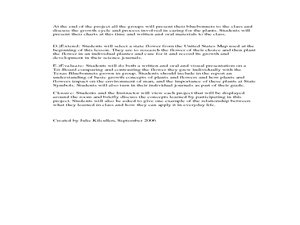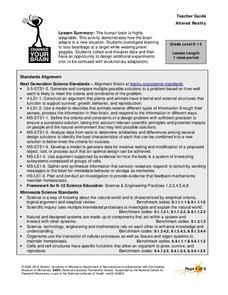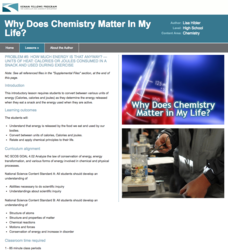Curated OER
How Does Your Blue Bonnet Grow?
Students explore the conditions needed to grow Texas Blue Bonnets. In this Blue Bonnet planting lesson plan, students recognize the differences in Texas Blue Bonnet. Students record their findings in a graphs and analyze their results.
Cornell University
Bacteria Take Over and Down
Bacteria outnumber all other forms of life on Earth. Scholars observe the growth of bacteria in petri dishes to understand their role in maintaining good health. Then, they observe the growth of bacteria after they introduce...
Curated OER
Bubble-ology and Bernoulli
Students explore aerodynamics and Bernoulli's principle by devising ways to keep bubbles aloft.
Curated OER
Investigative Case - "Swampeast Missouri"
Learners explore wetland hydrology and biology and decide whether or not to restore a wetland or retain dams and drainage systems. They examine the complexity of decisions regarding wetland restoration as well as investigate viewpoints...
Messenger Education
Snow Goggles and Limiting Sunlight
Why would someone need contact lenses that offer UV protection? With a 28-page packet full of instruction and worksheets, learners discuss solar radiation and its potential harm to eyes. They make snow goggles similar...
University of Minnesota
Altered Reality
Fascinate young life scientists by showing them how their brain learns. By using prism goggles while attempting to toss bean bags at a target, lab partners change their outlook on the world around them, producing amusing results....
NASA
Connecting Models and Critical Questions
Scholars use data to analyze and determine which sets of information need to be counted. They create a model to explain differences among chemical elements using graphs to prove concept mastery.
Curated OER
DNA Extraction from Yeast Cells
Students explore DNA. They work in groups and mix prepared detergent/ salt solution, meat tenderizer solution, Fleischman's yeast and water to extract DNA from yeast. Observations are recorded.
UAF Geophysical Institute
Carbon Footprint
Your young environmentalists can calculate their carbon footprint and discuss ways to reduce it with a worksheet about climate change. After reading a handout about what impact one's carbon footprint can have on the environment, kids...
Curated OER
Unit 2: Global to Local: Understanding My Place in the Hydrosphere
What does the ground around your home have to do with water pollution? Young ecologists learn about their local watershed and create their own cause-and-effect models of the hydrosphere.
LABScI
Catapult: Flight of the Marshmallows
Watch your marshmallows fly. The engaging STEM activity has groups create a catapult to launch marshmallows. After testing their prototypes, they consider improvements and redesign their catapults.
NASA
What's the Frequency, Roy G. Biv?
While all light travels at the same speed, each color in the visible light spectrum contains a different wavelength and frequency. Scholars determine the relationship between frequency and wavelength as they complete the activity. They...
NASA
A Different Perspective
What can we learn from the data? Young scholars analyze actual solar data to answer specific questions. The activity presents an opportunity for an open-ended investigation of the data to conclude a five-part series on solar winds.
National Nanotechnology Infrastructure Network
Silver and Bandages: Assessment of Inhibition of Bacteria by Silver Colloid-Impregnated Bandages
Silver: more than jewelry, it's also a natural antimicrobial agent. An inquiry-based lesson asks collaborative groups to design and implement an experiment to test this property. Using samples of silver nanoparticles and a strain of...
Kenan Fellows
What Is Heat?
If objects have no heat, how do they can gain and lose it? Scholars experiment with heat, temperature, and specific heat of various substances. They create definitions for these terms based on their own conclusions to complete the fourth...
Kenan Fellows
How Much Energy Is That Anyway?
The fifth instructional activity in the six part series introduces units of energy including calories, Calories, and joules. Scholars determine the energy released when eating a snack and during activity.

















